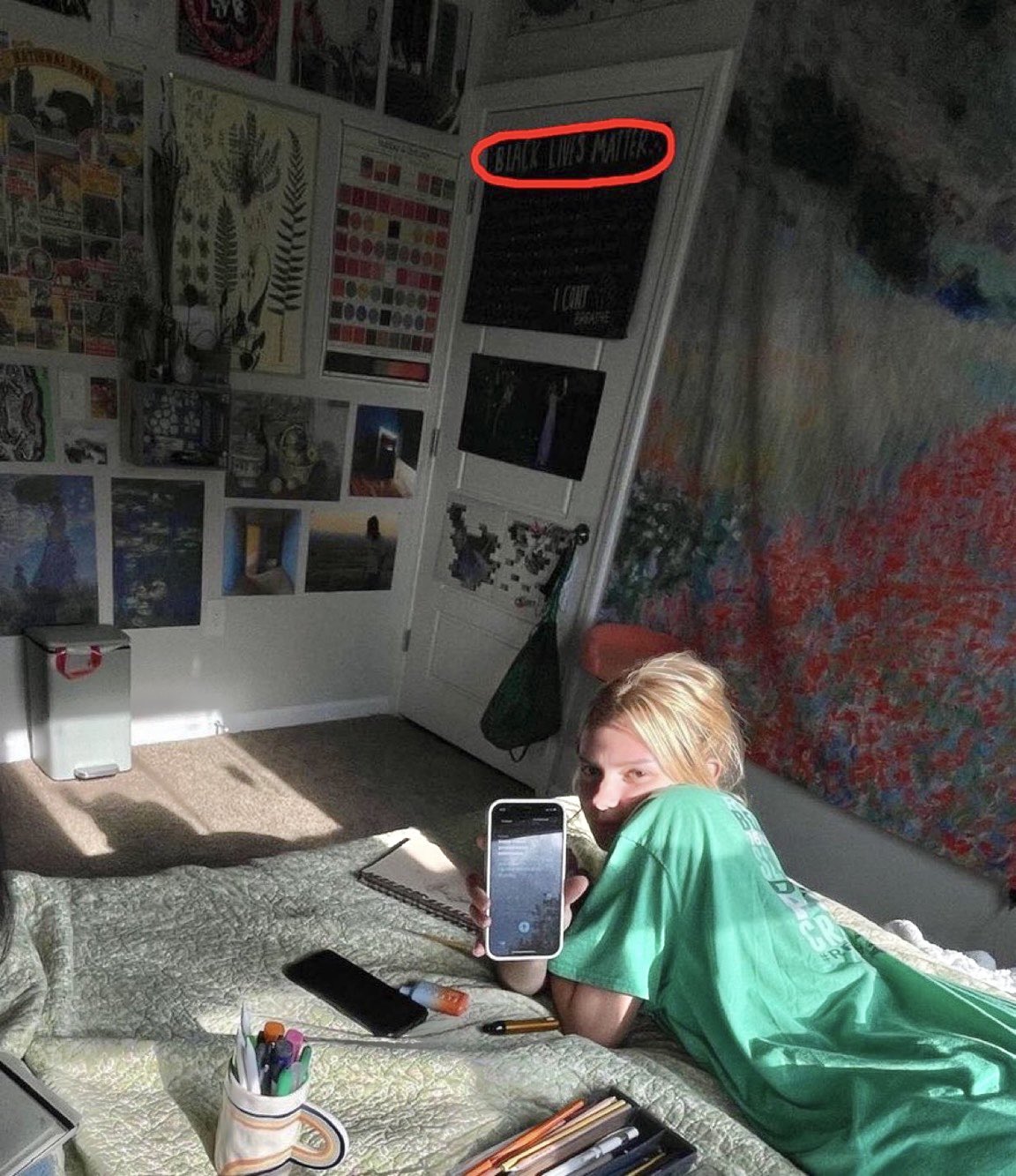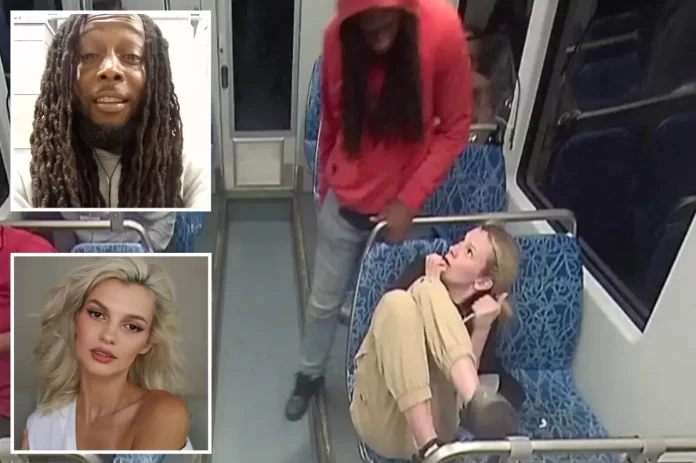The Final Call: “Don’t Come” – A Chilling Revelation in Iryna Zarutska’s Murder
As new details surface in the tragic case of Iryna Zarutska, the 23-year-old Ukrainian refugee whose life was brutally cut short on a Charlotte light rail train, the mystery deepens with the revelation of her final moments. Station cameras captured Zarutska engaged in a 37-second phone call just before the fatal attack on August 22, 2025. Subtitles from the surveillance audio reveal her last two words: “Don’t come.” The identity of the person on the other end remains undisclosed, but this haunting phrase has ignited speculation about whether Zarutska sensed impending danger, received a warning, or uttered a desperate plea. Coupled with previously emerged enigmas—a cryptic note on her train ticket (“Return to your seat”), a mysterious triangle symbol in her notebook—this phone call paints a portrait of a young woman whose final hours were shrouded in foreboding signs. As investigators probe these elements, the public grapples with the randomness of violence, systemic failures, and the profound loss of a vibrant life seeking refuge in America.
A Refugee’s Dream Shattered
Iryna Zarutska’s story is one of hope amid adversity. Born on May 22, 2002, in Kyiv, Ukraine, she fled the Russian invasion in August 2022 with her mother, Anna, sister, and brother, arriving in Charlotte, North Carolina, to rebuild. A graduate of Synergy College in Kyiv with a degree in Art and Restoration, Zarutska continued her studies at Rowan-Cabarrus Community College from 2023 to 2025, aspiring to become a veterinary assistant. Known for her radiant smile, artistic talent, and love for animals—she often walked neighbors’ pets and gifted handmade artwork—she embodied resilience. At Zepeddie’s Pizzeria, where she worked shifts, colleagues described her as cheerful and hardworking, texting her boyfriend that evening to say she’d be home soon after boarding the Lynx Blue Line at East/West Boulevard station around 9:46 p.m., still in her uniform.
Tragically, four minutes later, 34-year-old Decarlos Brown Jr., a homeless man with schizophrenia and a criminal history spanning 14 arrests since 2011—including armed robbery, felony larceny, breaking and entering, and communicating threats—lunged from behind with a folding pocket knife, stabbing her three times, including in the neck. Surveillance footage released by the Charlotte Area Transit System (CATS) on September 5 shows Zarutska clutching her neck as blood spills, collapsing in her seat while passengers remain largely inert. She was pronounced dead on the train at 10:05 p.m. Brown exited at the next stop, discarding the knife, and was arrested after treatment for a hand injury, facing state first-degree murder charges and federal counts of committing an act causing death on a mass transportation system, potentially carrying the death penalty. Authorities confirmed no prior connection between victim and suspect, with no disclosed motive, though audio captures Brown muttering, “I got that white girl,” sparking racial bias debates despite no hate crime classification.

The 37-Second Call: A Plea in the Shadows?
Emerging details from station cameras reveal Zarutska’s 37-second phone call, occurring moments before the attack, as a pivotal enigma. Subtitles from the footage indicate her final words: “Don’t come,” spoken urgently into the phone. The recipient’s identity is withheld, but speculation abounds: Was it her boyfriend, Stanislav Nikulytsia, whom she had texted earlier about heading home? Family statements note her loved ones grew concerned when she didn’t arrive, tracking her phone to the station only to learn of her death. Did she sense Brown’s fidgeting or widening eyes, as footage shows him shifting just before the stab? Or was it tied to earlier oddities, like the “Return to your seat” note on her crumpled ticket, clutched tightly by passengers’ accounts, or the triangle symbol on the last page of her work notebook, dated August 22, which colleagues say was unlike her usual vibrant sketches?
Investigators are analyzing call records and audio, but the brevity—exactly 37 seconds—suggests a hurried exchange. Online theories on X range from a premonition of danger to a coincidental reminder, but in context, it evokes a final, futile warning. Brown’s own jailhouse call to his sister, recorded days later, adds irony: He rambled about “materials” in his body forcing the stab, claiming Zarutska was “reading his mind,” and insisting, “That’s not me… Now they gotta investigate what my body was exposed to.” His family, citing his schizophrenia, pleaded for leniency, with his mother confessing he “shouldn’t have been released” on no-cash bail in January 2025 despite deteriorating mental health.
Bystander Apathy and Systemic Outrage
The footage’s horror extends beyond the attack: Passengers’ inaction amplifies the tragedy. For over two minutes post-stabbing, no one approached; one man eventually aided with CPR using his shirt, wiping blood from his phone to call 911 five minutes after, delayed only by the gore. Security guards were in the adjacent car, yet none arrived in the 7.5 minutes until police. X users decried the “banality of evil,” with one noting Zarutska’s desperate glance at a nearby woman who simply walked away. Influencer Ian Miles Cheong highlighted the betrayal: “Surrounded by people, she died as if she were alone.”
This has fueled national debates on crime in Democratic-led cities. Critics like former President Donald Trump and U.S. Attorney General Pam Bondi blamed “soft-on-crime” policies for Brown’s repeated releases, with Bondi stating, “Her horrific murder is a direct result of failed soft-on-crime policies.” Elon Musk and others accused media of undercoverage due to racial dynamics, contrasting it with cases like George Floyd’s. Charlotte Mayor Vi Lyles called for mental health reforms, noting Brown’s crisis but emphasizing compassion over villainization. The U.S. Transportation Secretary launched a CATS investigation, and City Council member Dimple Ajmera urged enhanced security.
A Family’s Grief and Lasting Echoes
:max_bytes(150000):strip_icc():focal(812x365:814x367)/Iryna-Zarutska-north-carolina-stabbing-victim2-91025-ed9740a626424264af74463721eb7f8a.jpg)
Zarutska’s family, through a GoFundMe raising over $12,000 for Ukrainian relatives, expressed heartbreak: “Iryna came here to find peace and safety and instead found tragedy.” Her uncle lamented, “She didn’t deserve that,” while tributes on X and Instagram mourn her as “scared, alone, and dying.” A candlelight vigil on August 31 honored her and other transit victims. Boyfriend Stanislav’s grief is palpable; her texts stopped abruptly, her last words a ghostly “Don’t come” that now haunts all who hear it.
The notebook’s triangle—possibly symbolizing change or warning—and ticket note suggest a pattern of unease, now intertwined with this call. Was it coincidence, or did Zarutska intuit peril? As Brown’s competency evaluation proceeds, these artifacts demand scrutiny.
Toward Justice and Prevention
Brown’s trial looms, but Zarutska’s case exposes vulnerabilities: unchecked mental illness, lax bail, inadequate transit security. Ukrainian communities voice horror, with one resident unsurprised by Charlotte’s crime woes. Reforms are pledged—more patrols, mental health access—but words must yield action. The “Don’t come” echoes as a tragic irony: She came seeking safety, only to issue a warning too late. In her memory, let it spur change, ensuring no refugee—or anyone—meets such a fate. As one X tribute states, “Iryna deserved protection… a society that stood up in her defense.”
